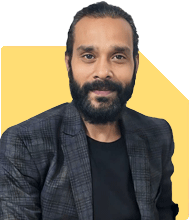Sushil Sukhwani | Answer |Ask -Follow
Study Abroad Expert - Answered on Apr 29, 2024

My son is M.S. general surgery from MGM UNIVERSITY MUMBAI.He has done oncology fellowship in Nashik Under Dr.Nagarkar.He is in practice at Beed,near Solapur.How he will be able able to get extra training in USA In oncology?Dr.s.y.Jadhav
To begin with, thank you for contacting us. I am happy to hear that your son has pursued his Master of Surgery in General Surgery from MGM University, has done oncology fellowship in Nashik, and is practicing at Beed. To answer your question first, I would like to tell you that in order to pursue additional training in oncology in the USA, there are a few steps that your son will require to follow:
Firstly, I would suggest that your son conducts a comprehensive study on oncology fellowship programs in the USA. Remember that the USA offers a number of well-regarded programs, and thus, your son should look for those programs that best resonate with his interests and professional objectives. Next, remember that the prerequisites for each fellowship program will be unique. A residency in internal medicine or an associated field, viz., general surgery, is generally required, which your son has already fulfilled. Particular tests viz., the United States Medical Licensing Examination (USMLE) may be demanded by certain programs. In addition, your son may also be required to prove his fluency in the English language through appearing for tests viz., the IELTS or TOEFL. Upon finding relevant programs, I would suggest that your son applies directly to them. Bear in mind that for the majority of medical disciplines, this generally entails submitting an application via a centralized system viz., ERAS (Electronic Residency Application Service). If your son has secured admission to a fellowship program, as the next step, in order to train in the USA, he would be required to acquire the necessary visa. For medical trainees, the J-1 visa is frequently used. Relocating to a different country for training calls for meticulous planning. So as the next step, your son will need to make arrangements for lodging, and travel, as well as make sure all the paperwork is in place. Once everything is in order, your son can then start his oncology fellowship training in the USA. Practical clinical experience, research, and academic endeavours are generally entailed in this.
In order to enhance his chances of obtaining a fellowship role, I would suggest that your son conducts an all-round study on programs, comprehends their prerequisites, and drafts a compelling application. Moreover, he should get in touch with and obtain guidance from instructors or colleagues who have followed comparable paths which can prove beneficial.
For more information, you can visit our website.
You may like to see similar questions and answers below
Sushil Sukhwani | Answer |Ask -Follow
Study Abroad Expert - Answered on Jan 02, 2024
Sushil Sukhwani | Answer |Ask -Follow
Study Abroad Expert - Answered on May 03, 2024
Dr Pananjay K Tiwari | Answer |Ask -Follow
Study Abroad Expert - Answered on Aug 28, 2024
Ramalingam Kalirajan |10908 Answers |Ask -Follow
Mutual Funds, Financial Planning Expert - Answered on Dec 20, 2025
Ramalingam Kalirajan |10908 Answers |Ask -Follow
Mutual Funds, Financial Planning Expert - Answered on Dec 20, 2025
Naveenn Kummar |237 Answers |Ask -Follow
Financial Planner, MF, Insurance Expert - Answered on Dec 20, 2025
Ramalingam Kalirajan |10908 Answers |Ask -Follow
Mutual Funds, Financial Planning Expert - Answered on Dec 19, 2025
Nayagam P P |10859 Answers |Ask -Follow
Career Counsellor - Answered on Dec 19, 2025
Ramalingam Kalirajan |10908 Answers |Ask -Follow
Mutual Funds, Financial Planning Expert - Answered on Dec 19, 2025
Ramalingam Kalirajan |10908 Answers |Ask -Follow
Mutual Funds, Financial Planning Expert - Answered on Dec 19, 2025
Ramalingam Kalirajan |10908 Answers |Ask -Follow
Mutual Funds, Financial Planning Expert - Answered on Dec 19, 2025
Radheshyam Zanwar |6751 Answers |Ask -Follow
MHT-CET, IIT-JEE, NEET-UG Expert - Answered on Dec 19, 2025
Radheshyam Zanwar |6751 Answers |Ask -Follow
MHT-CET, IIT-JEE, NEET-UG Expert - Answered on Dec 19, 2025
























